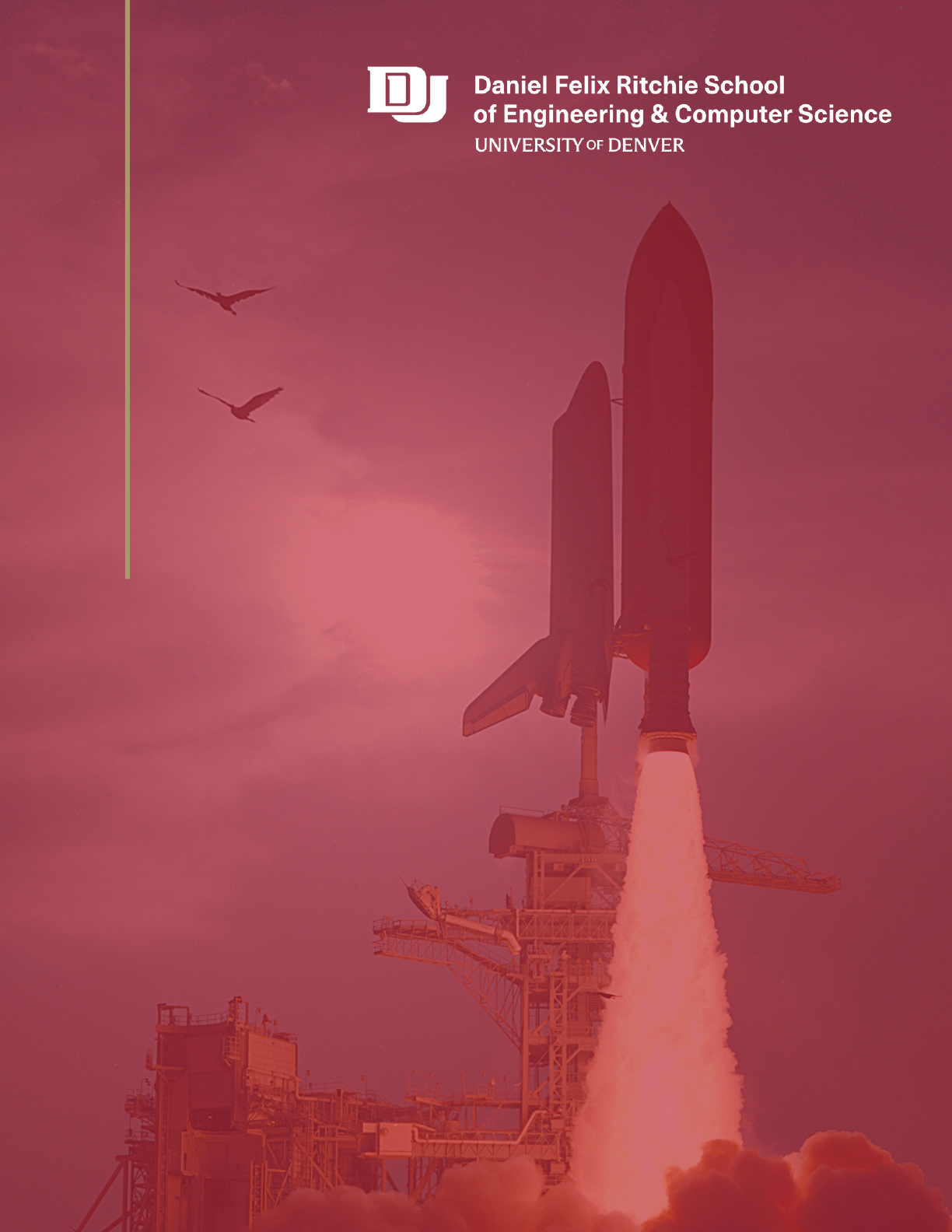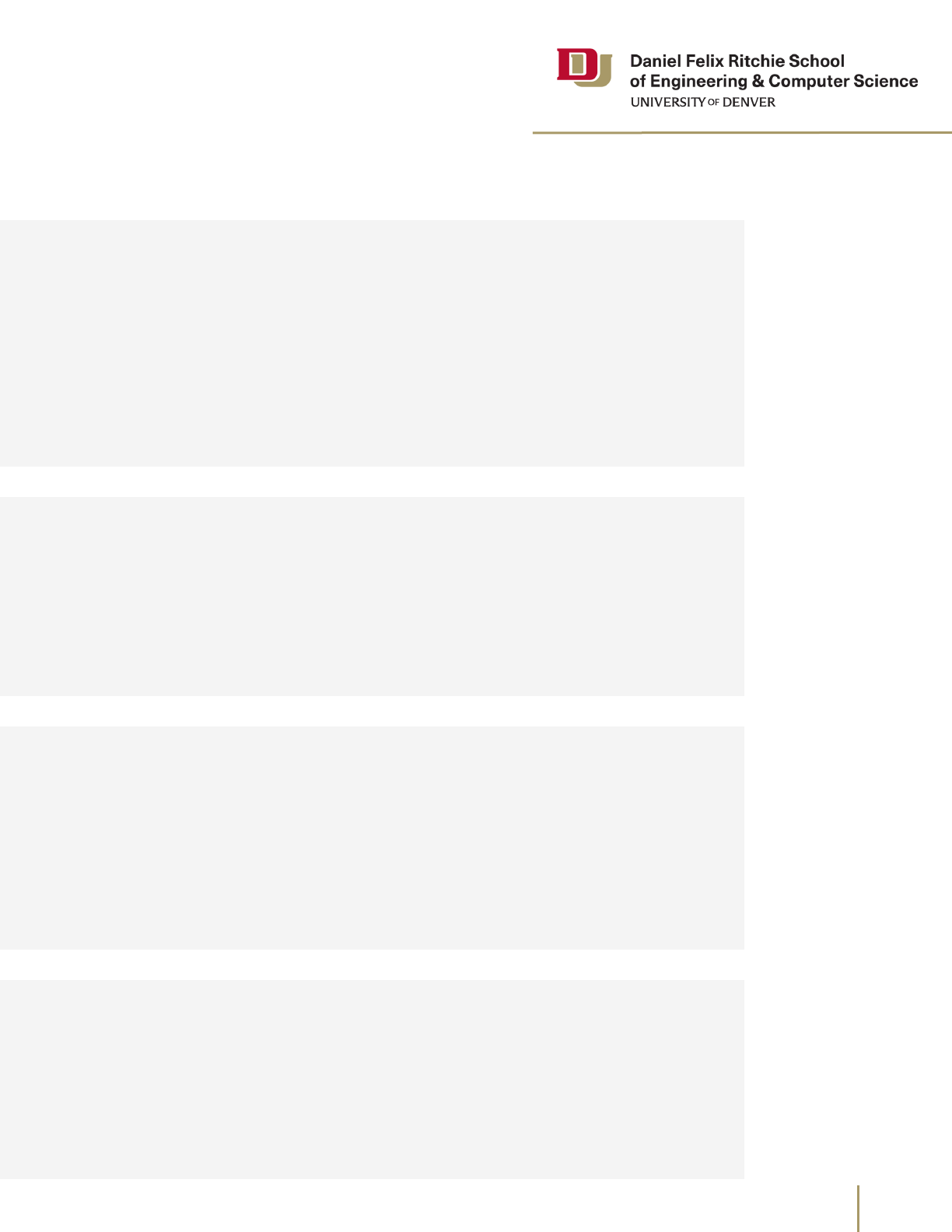
PROPEL YOUR
CAREER
Stackable Specialized Graduate Certificates and MS
Degree Programs from the University of Denver
exclusively for Lockheed Martin Employees

Table of
Contents
Fundamentals of Space Systems
04
MS in Systems Engineering
03
What you need to know
02
Fundamentals of Space Systems Course Descriptions
05
Systems Design and Architecture
06
Systems Design and Architecture Course Descriptions
07
System Application
08
System Application Course Descriptions
09
Course Schedule
10
Tuition, Fees, Reimbursement, & Leave of Absence
11-12
Admissions Requirements
13-14
Contact Us
15

Each certificate requires
completion of 16 credit hours of
coursework and may be taken in
any order. These certificates may
be completed individually or
combined to form a Master of
Science in Systems Engineering.
Courses are traditionally taught
weeknights after business hours at
Lockheed Martin’s Waterton
campus.
We are honored to work with you
and the Lockheed Martin
organization.
Each certificate
requires
completion of 16
credit hours of
coursework and
may be taken in
any order.
What you
need to know
02

Master of Science in
SYSTEMS ENGINEERING
The Master of Science in Systems Engineering is a program
available only to current Lockheed Martin employees.
This degree allows students to explore three specializations within systems
engineering (fundamentals of space systems, systems design & architecture, and
systems applications). These specialization areas have been selected to coincide
with emerging technologies in the industry today. The purpose of this program is to
serve the engineering profession and the Colorado community through advanced,
multidisciplinary studies in mechanical, computer, and electrical engineering.
Three Stackable Certificates
01
• 48 Credit Hours Total
• Each certificate is 4 courses (16 total credit hours)
• Combination of Core and Elective Classes
Non-Thesis Option*
02
• 45 Credit Hours Total
• Combination of Core, Concentration and Elective
Classes
Thesis Option*
03
• 13-17 Credit Thesis
• 45 Credit Hours Total
• Combination of Core, Concentration and Elective Classes
There are three paths to the MS in Systems Engineering:
03
*Detailed information regarding degree requirements can be found in the
DU Graduate Bulletin.

Stackable Certificate #1
Objectives & Collective
Outcomes
This Specialized Graduate Certificate
requires completion of a minimum of
four graduate-level courses, or 16
Quarter Hours (QHs). Completion of this
certificate provides expertise in the
fundamentals of space systems
engineering, space system design and
integration, and space project
management.
fundamentals of space and missile
systems analysis, design and
operation
ability to design, model, analyze and
evaluate space and missile systems
understanding of hardware and
software architectural layouts and
different architectural
configurations
mastering understanding of
component integration to meet
performance project management
This certificate is recommended for
entry-level space employees seeking a
greater understanding of space systems
and systems engineering.
This certificate will focus on the
following skills:
Courses associated with this certificate
introduce students to an overview of
space systems engineering, its major
subsystems within a space system,
appropriate design considerations, and
project management.
Required Courses
Fundamentals of
Space Systems
ENMT 4000:
Space Systems Design I (4 QHs)
ENMT 4010:
Space Systems Design II (4 QHs)
ENMT 4100:
Systems Engineering (4 QHs)
ENGR 4810:
Project Management (4 QHs)
04

Fundamentals of Space Systems
Course Descriptions
05
ENMT 4000: Space Systems Design I (4 QHs)
This is the first of the two-course sequence to
familiarize the student with the basic design of space
systems, application of advanced theories and
concepts as they relate to the development of
spacecraft and missile subsystems, and how such
subsystems are related under the umbrella of
systems engineering.
Emphasis is given on the practical aspects of space
system design and integration. This course is team-
taught by faculty and functional experts in their
respective fields of study.
Course Requirements: Assignments and Tests
ENMT 4010: Space Systems Design II (4 QHs)
This is the second of the two-course sequence and it is
team-taught by faculty and functional experts in the
respective fields of study.
Lecture topics include payload communications,
guidance and control, spacecraft electric power,
propulsion systems, radiation and avionics and sensor
subsystems.
There is focus on existing space system architectures
and the classical methods of designing them with
emphasis in multi-attribute utility theory as a new
design paradigm for space systems, when combined
with integrated concurrent engineering and efficient
searches of large architectural tradespaces. Designing
for flexibility and uncertainty is considered, as are
policy and product development issues.
Course Requirements: Assignments and Tests.
ENMT 4100: Systems Engineering (4 QHs)
This course provides a framework for understanding
and acquiring the knowledge, tools, and systems
engineering skills to successfully design, develop,
produce, integrate, test, operate, and maintain
complex systems.
Key skills include: systems thinking, identifying
stakeholder needs, requirements development,
mission design and architecture definition, technical
management, design integration, and product
verification and validation.
The course emphasizes the execution of lifecycle
models for systems engineering processes that
reduce the risk inherent in each lifecycle stage.
Lifecycle models to be discussed include: Waterfall,
Spiral Development and Agile.
Course Requirements: Assignments, Projects, and
Tests.
ENGR 4810: Project Management (4 QHs)
This course introduces the student to the key
elements of a successful product delivery system,
including a product delivery process, core skills,
training, tools, and project leadership.
Core skills include: team leadership; project
planning; budget, schedule, risk and opportunity
management; product quality management;
contract/subcontract management and utilization
of modern Earned Value Management (EVM) and
Enterprise Resource Planning (ERP) systems.
Course Requirements: Assignments and Tests.

Stackable Certificate #2
Objectives & Collective
Outcomes
This Specialized Graduate Certificate
requires completion of a minimum of
four graduate-level courses, or 16 QHs.
Two courses (8 QHs) are required
courses, and two courses (8 QHs) are
elective courses. Completion of this
certificate provides expertise in support
for proposals, after contract award and
through critical design reviews, as well
as system design and integration.
understanding the state-of-the-art in
complex (e.g. space, missile) systems and
how they are designed, modeled,
controlled, and evaluated
tackling challenges related to mission
technical design and mission analysis
interpreting mission-specific
architectures, including modularity and
reconfigurability
completing requirements decomposition
and resource allocation
performing risk analysis, validation and
verification, and fault management
running integrated control and
diagnostics
analyzing networks for control and
communication purposes
utilizing software-based toolsets to
achieve required objectives
This certificate is targeted for System
Architects and Systems Engineers working
the front-end of programs and proposals.
This certificate will focus on the following
skills:
Required Courses
Systems Design
and Architecture
ENMT 4285:
Complex System Architectures, Models
and Tools (4 QHs)
ENGR 4790:
Systems Engineering Requirements (4 QHs)
ENMT 4225: Systems Models,
Simulations, and Tools (4 QHs)
ENMT 4270: Fundamentals of System
Electrical, Mechanical and Software
Design (4 QHs)
ENGR 4910: Conceptual Design (4 QHs)
ENGR 4920: Aerospace Missions (4 QHs)
06
Recommended Elective Courses
(choose at least two):

Systems Design and Architecture
Course Descriptions
07
ENMT 4225: Systems Models, Simulations, and
Tools (4 QHs)
The course focuses on modeling and design of complex
engineering systems that meet a-priori performance
characteristics. The whole cycle from design and
modeling, to implementation and testing is followed,
along with computer architecture, hardware and
software design techniques, real-time data flow
diagrams, state-transition diagrams, and performance
evaluation methods.
Model-based Systems Engineering techniques are used
to leverage SML (Cameo MagicDraw tool) to develop
concepts of operations and define requirements. A major
design project is assigned.
Course Requirements: Assignments, Projects, and Tests.
ENMT 4270: Fundamentals of System Electrical,
Mechanical and Software Design (4QHs)
Design of individual electrical and mechanical
components comprises a system. Comprehensive
integrated approach makes the transition from design
of individual electrical/mechanical components into a
complete electrical-mechanical system design.
Topics include systems engineering of complex
electronics (FPGAs, ASICs, Hybrids), electromagnetic
compatibility and analysis, electromagnetic
interference, system power modeling and energy
efficiency, electrical systems integration and test
methodologies, mechanical system modeling, system
thermal/stress analysis methods and tools, mass
management, mechanical systems integration and test
methodologies.
Course Requirements: Assignments and projects.
ENMT 4285: Complex System Architectures, Models
and Tools (4 QHs)
The course focuses on mission requirements and how a
mission should function by examining different
architecture configurations and tools for modeling
purposes.
Example architecture models include: executable,
networked, distributed, real-time, information assurance,
framework, and reference.
Students learn about development and allocation of
functional and non-functional requirements and how to
analyze architecture issues.
Emphasis is on development of Service-Oriented
Architecture (SOA) solutions and ability to model and
analyze using Systems Modeling Language (SysML).
Course Requirements: Assignments and projects.
ENGR 4790: Systems Engineering Requirements
(4 QHs)
The course covers fundamentals of design and
requirements analysis of complex systems to meet
overall mission requirements.
It spans the whole requirements engineering phase
that includes requirements analysis, decomposition,
derivation, allocation, verification and validation
planning. Students acquire expertise in creating UML
and SYML case diagrams and implementing
verification/validation plans. Requirement
management methods and tools, associated
vernacular, and requirements configuration control
are also covered.
Course Requirements: Assignments, tests, and a
major project.
ENGR 4910: Conceptual Design (4 QHs)
Conceptual Design specifies the principal solution. Concept
Design rarely starts at the same point; you might have an
existing design that needs iterating or the requirement to
create a conceptualized form. Problem solving consists of
using generic or ad hoc methods in an orderly manner to find
solutions to problems.
There are many types of intellectual property such as patents,
and some countries recognize more than others. Designers
assess the many different directions a design could take at
this stage will allow you to identify what you like and don’t like
from each one. The preferred concept will then be further
developed using engineering drawings, schematics and
possibly 3D models which will show how the design will look
and operate.
ENGR 4920: Aerospace Missions (4 QHs)
The design “problem” in Advanced Aerospace
Systems describes the complications in the
conceptual design of various types of aircraft,
spacecraft, and complex vehicles.
It covers the following topics: design of orbital
spacecraft, design for Moon missions (such as
landers), design for Mars missions (including rovers),
design of an unmanned drone for surveillance (high-
altitudes), CubeSats (having large constellations),
and rockets and missiles (including hypersonic).
This class stands as a reference of interest to
engineers and scientists working in aerospace
engineering and related topics.

Stackable Certificate #3
Objectives & Collective
Outcomes
This Specialized Graduate Certificate
requires completion of a minimum of
four graduate level courses, or 16 QHs.
Two courses (8 QHs) are required, and
two courses (8 QHs) are elective.
Completion of this certificate provides
hands-on expertise in system design,
integration, implementation and testing.
system analysis, synthesis and models
for decision making
electromechanical integration
component- and system-level validation
and verification
fault- tolerance, reliability and feasibility
analysis and design for resilience as
attributes for developing trusted
systems
designing systems with performance
guarantees in the presence of faults and
failures
This certificate is targeted towards system
applications with an emphasis on
implementation and testing.
This certificate will focus on the following
skills:
Projects will be related to the professional
student’s domain of expertise.
Required Courses
Systems
Application
ENMT 4275:
Applied System Electrical, Mechanical
and Software Design (4 QHs)
ENGR 4680:
Fault Diagnosis and Prognosis for Engineering
Systems (4 QHs)
ENGR 4620: Systems Optimization
ENMT 4280: Design for Feasibility and Resilience
ENGR 4940: Mission Operations Controls
08
Recommended Elective Courses
(choose at least two; 4 QHs):

Systems Applications Course Descriptions
09
ENMT 4275: Applied System Electrical, Mechanical
and Software Design (4 QHs)
This is a practice-centered course that will allow
students to assess case studies of design,
implementation, testing, validation, and
verification of complete complex systems to meet
mission requirements with performance
guarantees.
Course Requirements: Projects.
ENGR 4680: Fault Diagnosis and Prognosis
for Engineering Systems (4 QHs)
The course provides the fundamentals of fault
diagnosis and failure prognosis with a focus on
intelligent fault diagnosis and failure prognosis
technologies for condition-based maintenance.
It includes interdisciplinary methods required to
understand the physics of failure mechanisms in
materials, structures, and rotating equipment;
strategies to detect faults or incipient failures and
predicts the remaining useful life of failing
components.
Case studies are used throughout to illustrate
enabling technologies in a holistic and integrated
approach that addresses the various
interdisciplinary components of the field, from
engineering to business management.
Course Requirements: Assignments and projects.
ENGR 4680: Systems Optimization (4 QHs)
Reliability engineering is a sub-discipline of systems
engineering that emphasizes dependability in the
lifecycle management of a product. Reliability,
describes the ability of a system or component to
function under stated conditions for a specified period
of time. Reliability is closely related to availability, which
is typically described as the ability of a component or
system to function at a specified moment or interval of
time. Normally, quality focuses on the prevention of
defects during the warranty phase whereas reliability
looks at preventing failures during the useful lifetime of
the product or system from commissioning to
decommissioning. Diagnosis is used, with variations in
the use of logic, analytics, and experience, to determine
"cause and effect". In systems engineering, it is
typically used to determine the causes of symptoms,
mitigations, and solutions. Prognostics is an
engineering discipline focused on predicting the time
at which a system or a component will no longer
perform its intended function. This lack of performance
is most often a failure beyond which the system can no
longer be used to meet desired performance. The
predicted time then becomes the remaining useful life
(RUL), which is an important concept in decision
making for contingency mitigation. Success in this
course requires knowledge of probability theory and
statistics, and familiarity with MATLAB/Simulink.
ENGR 4280: Design for Feasibility and Resilience (4 QHs)
In this course, students will explore methodologies
and techniques to architect systems for reliability,
maintainability and sustainability. They will also
explore probabilistic and deterministic methods of
improving reliability and resilience of complex
systems.
Additional topics for the course include,
probabilistic risk assessment; reliability analysis;
error analysis; uncertainty analysis, quantification
and handling; random, common cause, external
events and systematic uncertainty; comparison of
models and case studies.
Course Requirements: Assignments and projects
ENGR 4940: Mission Operations Controls (4 QHs)
Space operations is based at a centralized control center, a facility used for command & control (C2), and
related communication equipment (antennas, etc.). The human operators conduct the day-to-day
operations for controlling the spacecraft. They control the spacecraft and its payloads, and carry out all
activities related to mission planning and scheduling.
For example, normal orbital operations are interrupted every six months to conduct orbital maneuvers.
Launch operations begin with spacecraft integration and checked-out for launch. Once safely placed in
orbit, command and control goes back and forth between the ground control station and the spacecraft
or satellite.
A key aspect of spacecraft operations is the transferring of data from the onboard instruments collected
by its payload to the ground, eventually disseminating the data to concerned users and analysts through
a ground data network. This requires an on-orbit communication architecture.

Course Schedule
Summer 2023
TBD Elective Course
ENGR 4504: Graduate Capstone Design IV
10
Summer 2023-Spring 2026
Fall 2023
ENMT 4000: Space Systems Design I
ENGR 4790: Systems Engineering Requirements
ENGR 4810: Project Management
ENGR 4501: Graduate Capstone Design I
Winter 2024
ENMT 4010: Space Systems Design II
ENMT 4270: Fundamentals of System Electrical,
Mechanical and Software Design
ENGR 4910: Conceptual Design
ENGR 4502: Graduate Capstone Design II
Spring 2024
ENMT 4010: Space Systems Design II
ENGR 4920: Aerospace Missions
ENMT 4280: Design for Feasibility and Resilience
Summer 2024
ENGR 4910: Conceptual Design
Fall 2024
ENMT 4000: Space Systems Design I
ENMT 4275: Applied System Electrical, Mechanical
and Software Design
ENGR 4810: Project Management
Fundamentals of Space Systems
Systems Design and Architecture
Systems Application
Electives & Other
Winter 2025
ENMT 4010: Space Systems Design II
ENMT 4225: Systems Models, Simulations, and Tools
ENGR 4940: Mission Operations Controls
Spring 2025
ENMT 4100: Space Systems Design II
ENMT 4285: Complex System Architectures,
Models and Tools
ENGR 4620: Systems Optimization
Summer 2025
TBD
Fall 2025
ENMT 4000: Space Systems Design I
ENGR 4790: Systems Engineering Requirements
ENGR 4810: Project Management
Winter 2026
ENMT 4010: Space Systems Design II
ENGR 4920: Aerospace Missions
ENGR 4680: Fault Diagnosis and Prognosis
for Engineering Systems
Spring 2026
ENMT 4100: Space Systems Design II
ENMT 4270: Fundamentals of System Electrical,
Mechanical and Software Design
ENMT 4280: Design for Feasibility and Resilience

Tuition, Fees, &
Reimbursement
As a Lockheed Martin employee, your tuition reimbursement
and billing processes are unique.
First, you will fill out the 2022-2023 Lockheed Martin
Tuition Deferment form and send it to Kaitlyn Jones
([email protected]) in the Bursar's Office or complete
the form through your Applicant Status Portal. This form
states that your tuition bill will be deferred until final
grades are posted for the quarter so that you can submit
said final grades to Lockheed Martin's internal tuition
reimbursement company (Bright Horizons/EdAssist) to
receive your tuition reimbursement.
You will then fill out the internal Lockheed Martin tuition
reimbursement application. In order to receive
instructions on filling out this application, please contact
Zach Yinger ([email protected]). Lockheed
Martin does not pay the University of Denver directly for
your tuition costs. Students are responsible for ensuring
that their tuition bill is paid on time (the deferred due
date is listed on the deferred tuition bill you will receive
at the end of the quarter) regardless of reimbursement
from Lockheed Martin.
DU bills students directly and the student is financially
responsible for paying their tuition bill. You will receive
your tuition bill through your DU-assigned student email
address.
11
More information on tuition caps
DU bills LMCO students directly and it is the student, not LMCO, who is financially responsible for
coursework. LMCO students are responsible for following LMCO policy to receive tuition
reimbursement and paying DU according to billing deadlines.
LMCO students must sign DU’s Billing Agreement every academic year in MyDU (comparable to all
graduate students at DU). You will receive notice through your DU-assigned email address to complete
this task along with instructions.
For the 2022 - 2023 academic year, the tuition
cost is $1,539 per credit hour. As a MS or PhD
student, you may take up to three four-credit-
hour courses or twelve credit hours and as a
Certificate or Non-Degree Seeking student, you
may take up to two four-credit-hour courses or
eight credit hours and remain underneath your
Lockheed Martin annual cap.
The quarter you take your twelfth (MS & PhD
students) or eighth (Certificate & Non-Degree
Seeking students) credit hour, you will receive a
payment from the Electrical Engineering
Department at DU on your tuition bill once final
grades are posted that covers the remaining
tuition amount that Lockheed Martin's internal
tuition reimbursement program (Bright
Horizons/EdAssist) does not cover in their
$12,500 (MS & PhD students) or $7,500
(Certificate & Non-Degree Seeking students)
annual tuition reimbursement cap.

Tuition, Fees, Reimbursement
& Leave of Absence Policy
More information on tuition caps and Leave of Absence
The below is more relevant for non-ELDP LMCO students who have stricter caps on tuition reimbursement than
ELDP students. That said, we have adjusted our tuition/billing to fit within LMCO’s annual cap for MS and PhD
students ($12,500 for three courses in a calendar year) and graduate certificate and non-degree-seeking students
($7,500 for two courses in a calendar year):
12
When enrolled in single courses as a non-degree seeking student, LMCO Employees will be
allowed to take up to 8 credit hours within a calendar year at a maximum tuition charge of $7,500.
LMCO employees who have taken the maximum number of single course credit hours and are
subsequently admitted to the graduate school as degree-seeking students in the same calendar
year will be allowed to take an additional 4 credit hours at a maximum tuition of $5,000. Total
credit and tuition limit for the calendar year will be 12 credit hours and $12,500.
When enrolled in courses as a degree-seeking student, LMCO employees will be allowed to take
up to 12 credit hours within a calendar year at maximum tuition charge of $12,500.
Certificates: the annual cap is $7,500 for graduate certificates. If LMCO employees are interested
in pursuing this as an option, LMCO employees will split courses across more than one calendar
year or enroll as degree-seeking students and complete their certificates as part of taking the
corresponding courses in their progress toward their master’s degrees.
If LMCO employees enroll in dual programs in sequence or concurrently during the year, the
higher cap will always apply. For example, if LMCO employees complete a certificate and then
enroll as master’s students, their annual cap will be $12,500.
LMCO employees taking more credits in a calendar year than the LMCO reimbursement annual
cap, they will pay out of pocket for these credits. Coursework will cost the same per credit hour
but may not be reimbursable by LMCO depending on the students' circumstances. If you have
questions on how to request for an increase in your annual tuition reimbursement through
Lockheed Martin, please contact Zach Yinger ([email protected])
Leave of Absence Policy
If you take all three courses before the Fall quarters, you are able to take “Personal Leave of Absence”
from the University so that you remain an active student in the DU system and be able to register for the
next quarter. Personal Leaves of Absences are not penalized and can be used for a multitude of reasons
(maternity/paternity leave, maximizing your annual tuition cap, major life changes, etc.).

LMCO-Specific Application Link
The application available to the general public does not have the LMCO-specific programs
and you will not receive the LM/DU benefits if you do not apply through this link. Please
use your LMCO e-mail address to verify employment.
(https://gradadmissions.du.edu/apply/?sr=1ed854af-1103-419b-a411-7f0c9e4287fe)
Lockheed Martin Employee Certificate & Masters Application Requirements
Admissions Requirements
$65.00 Application Fee
Paid by employee, but potentially reimbursable through Lockheed Martin depending on
employee’s individual circumstances.
University Minimum Degree and GPA Requirements
The University of Denver offers admission to graduate applicants who demonstrate the
highest potential for successful graduate study. The minimum baccalaureate GPA for
graduate admission consideration at the University of Denver is a cumulative 2.5 on a 4.0
scale, or a 2.5 on a 4.0 scale for the last 60 semester credits or 90 quarter credits
(approximately two years of work). For more details, please visit the Graduate Bulletin.
Transcripts
One official transcript from each post-secondary institution is required.
Employment Verification Letter Signed by Supervisor
Applicants will be asked to provide their supervisor’s email address through the
application system so that the letter may be signed through the email they receive.
13
If you are looking to begin a PhD program at the Ritchie School of
Engineering and Computer Science, please contact Carson Koinzan,
[email protected] to discuss additional steps you will need to take in
order to apply for your intended program.

Term
Start Month
Final Submission
Deadline
Fall 2023
September
August 15, 2023
Winter 2024
January
November 15, 2023
Spring 2024
March
February 15, 2024
Summer 2024
June
May 15, 2024
Lockheed Martin Employee Certificate & Masters Application Requirements
Admissions Requirements
Additional Standards for Non-Native English Speakers
Official scores from the Test of English as a Foreign Language (TOEFL), International
English Language Testing System (IELTS) or Cambridge English: Advanced (CAE) are
required of all graduate applicants, regardless of citizenship status, whose native language
is not English or who have been educated in countries where English is not the native
language.
The minimum TOEFL/IELTS/CAE test score requirements for the degree program are:
14
• Minimum TOEFL Score (paper-based test): 550
• Minimum TOEFL Score (internet-based test): 80
• Minimum IELTS Score: 6.5
• Minimum CAE Score: 169
2023 - 2024 Application Deadlines

Carson Koinzan | Program Coordinator
303.871.6173
For questions regarding admissions, applications, course
registrations, tuition reimbursement, billing and accessing the
LMCO-specific application link.
Wendell Chun | Faculty Director
303.871.6890
For questions regarding advising and curriculum.
Kaitlyn Jones | Tuition Reimbursement & Billing
303.871.2449
For questions regarding tuition reimbursement processes,
tuition billing, financial holds, and tuition deferment processes.
Zach Yinger | Lockheed Martin Point of Contact
For questions regarding EdAssist/Bright Horizons tuition
reimbursement through Lockheed Martin.
Contact Us
15
